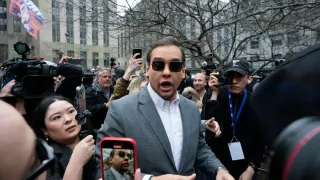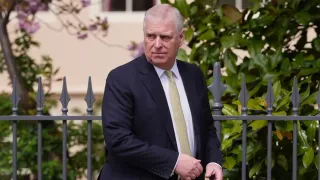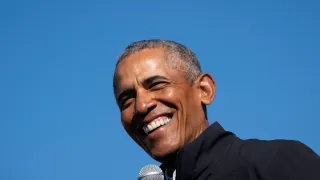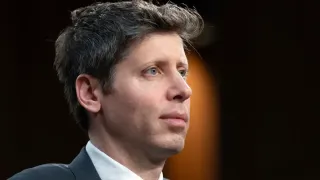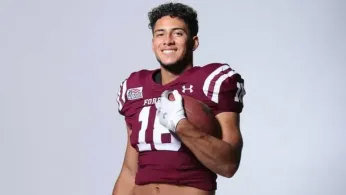
4 hours ago
Breaking Boundaries On and Off the Field: Jaden Vazquez on Bisexuality, College Football, and Identity
READ TIME: 15 MIN.
In a recent interview with Queerty, Jaden Vazquez, a rising star in college football, spoke candidly about the intersections of his bisexual identity and his experiences as an athlete. Vazquez described feeling caught between worlds:"too gay for straight people, too straight for gay people," capturing a sense of isolation and misunderstanding that persists for many bisexual individuals in both mainstream and LGBTQ+ spaces . His reflections shed light on the ongoing challenges faced by bisexual athletes and the broader quest for acceptance, representation, and understanding.
Vazquez’s interview reveals the unique pressures faced by bisexual men in sports, an environment often characterized by rigid gender norms and expectations. He recounted moments of discomfort and alienation, describing how his identity is sometimes met with skepticism or outright dismissal from both straight teammates and gay peers. The phrase"too gay for straight people, too straight for gay people" encapsulates the double bind often felt by bisexual individuals: facing erasure or invalidation because they do not fit within binary definitions of sexuality .
Bisexual erasure—the tendency to ignore or dismiss bisexual identities—remains a pervasive issue. A Human Rights Campaign report highlights that bisexual people experience higher rates of mental health concerns and lower levels of social support compared to their gay and lesbian counterparts . Vazquez’s experiences align with these findings, illustrating how the lack of acceptance in both straight and queer circles can compound feelings of isolation.
Vazquez’s decision to come out as bisexual was shaped by a complex mix of personal courage and the realities of his environment. He shared that coming out was not a singular moment but an ongoing process, marked by both support and resistance. Some teammates offered encouragement and understanding, while others responded with discomfort or silence .
His story is emblematic of broader trends in sports, where LGBTQ+ athletes often face heightened scrutiny after coming out. Organizations like Athlete Ally have documented persistent homophobia and biphobia in athletic environments, noting that visibility is often the first step toward changing entrenched attitudes . Vazquez’s openness serves as a catalyst for dialogue, challenging stereotypes and inviting greater inclusivity.
The interview touched on the question,"Is football gay?"—a provocative inquiry that unpacks cultural perceptions of masculinity, sexuality, and athleticism. Vazquez noted that football, like many sports, is steeped in traditions that can be exclusionary, yet he also observed growing shifts toward acceptance. High-profile athletes such as Carl Nassib and Ryan Russell have publicly come out, paving the way for others to follow suit . Vazquez’s story adds to this evolving narrative, demonstrating that authenticity and athletic excellence are not mutually exclusive.
Visibility remains a key issue for bisexual athletes. Vazquez expressed a desire to see more bisexual representation in sports media and LGBTQ+ advocacy, noting that bisexual identities are often overlooked in favor of more binary narratives . Research by the Bisexual Resource Center underscores the importance of positive role models and affirming spaces, especially for young people navigating identity in challenging environments .
In sports, where visibility can be a powerful tool for change, Vazquez’s presence challenges stereotypes and invites a more nuanced understanding of sexuality. His advocacy signals a broader push within the LGBTQ+ movement to recognize and uplift bisexual voices.
Despite progress, Vazquez’s experiences illustrate persistent barriers to full inclusion. He discussed the need for comprehensive education and allyship within both athletic and queer communities. Educational initiatives, such as those promoted by GLSEN, are crucial to fostering safer and more supportive environments for all LGBTQ+ individuals .
Vazquez emphasized that true allyship involves listening, learning, and challenging assumptions—whether on the field or off. He called for coaches, teammates, and organizations to actively create spaces where bisexual athletes feel seen and valued, not forced to choose between aspects of their identity.
The conversation also touched on intersectionality—the ways race, sexuality, and other identities interact. Vazquez, a Latino athlete, noted that cultural expectations around masculinity and sexuality can further complicate the process of coming out and finding acceptance . Studies show that LGBTQ+ athletes of color often face additional barriers, including racism and cultural stigma, which can make their journeys even more challenging .
Vazquez’s perspective underscores the importance of intersectional advocacy—addressing not only sexuality but also the unique experiences of LGBTQ+ people from diverse backgrounds within sports.
Vazquez remains optimistic that change is possible. “Being my authentic self has given me strength on and off the field,” he told Queerty, urging others to embrace vulnerability and challenge outdated norms .
Jaden Vazquez’s story is a powerful reminder that visibility and authenticity can drive social change, even in spaces historically resistant to LGBTQ+ inclusion. By sharing his journey, Vazquez not only advocates for himself but also opens the door for countless others who feel caught between worlds. His call for greater understanding and respect resonates across sports, LGBTQ+ communities, and society at large, challenging everyone to rethink what it means to belong.
